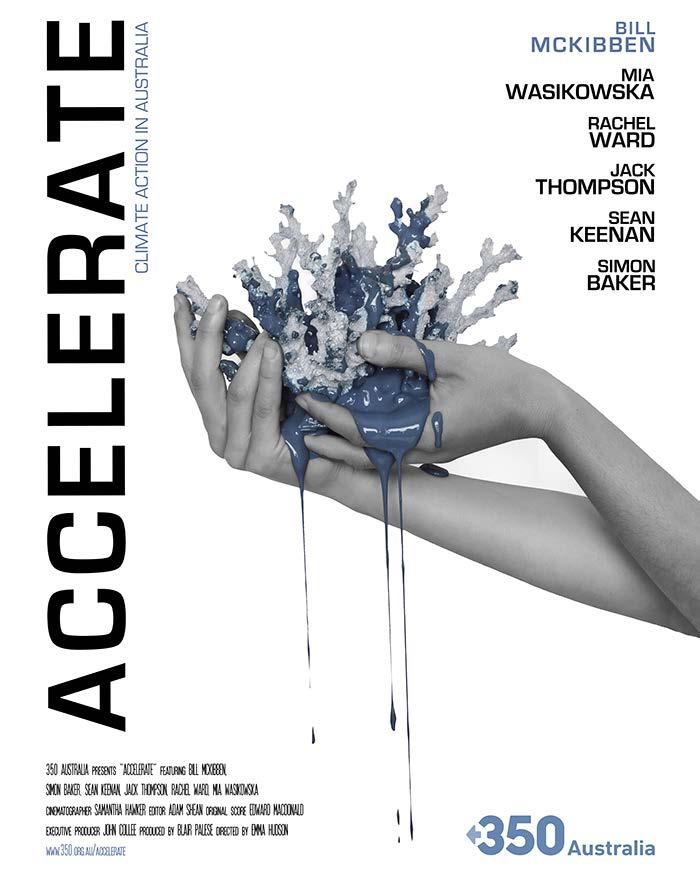
3 minute read
Free climate action event
Accelerate
free climate action event
Accelerate is an Australia-focused film which shows how we can fight against new fossil fuel projects and push for a fair and fast transition to 100% renewable energy. Accelerate follows Bill McKibben, the founder of 350.org, during his 2018 tour of Australia as he works to share his ideas, inspire communities and motivate people to ensure climate change is the number one issue for us all. Bill is one of the most acclaimed environmental activists in the US. Following the one-hour movie, there will be a chance to have your questions answered in a Q and A session. The panel will include Dr Mark Diesendorf BSc (Hons) PhD, Australian academic, environmental scientist and campaigner. This is a wonderful opportunity to learn about the problems caused by climate change and, importantly, also the solutions. Come to exchange ideas and be inspired by this engaging film and our informative guest speakers. Everyone welcome. Where: Lane Cove Library When: Monday May 6, 6pm for 6.30 start RSVP/ Cost: Free but please register via Eventbrite.com.au or https://tinyurl.com/yyfjm25h Hosted by Lane Cove Sustainability Action Group Inc and supported by Lane Cove Council. For information on this event or Lane Cove Sustainability Action Group activities please contact Lyn Nasir on 0421 442 840 or visit www.lanecovesustainability.org

Make an advance
Being prepared for future possibilities is an important part of life. All of us, regardless of health or age, should make known our health preferences to prepare (as much as possible) for all sorts of future events. Of course, it can be especially important for people with an advanced chronic or life-limiting illness, or anyone old enough to be at risk of losing competence. Last week, a national awareness initiative called Advanced Care Planning Week challenged us all to start heartfelt conversations with people we’re close to about what ‘living well’ means to us. This includes thinking about who we’d want to speak for us if we were somehow unable to speak for ourselves. It goes beyond filling in a form – it’s a two-way street with a commitment to honour an individual’s preferences based on their personal values, and beliefs. An advanced care directive is only used if we’re unable to make or communicate decisions. It’s then used to guide decisions by medical staff in consultation with an appointed substitute decision-maker if one has been nominated, and/or family. Otherwise, when there’s serious illness and no directive, doctors have to make treatment decisions based on their assessment of a person’s best interests – and perhaps include unwanted treatments. Completing an advance care directive reassures and empowers the people making them, their nearest and dearest, and medical professionals because it gives everyone a clear idea of what someone wants in the event of illness, injury or incapacity. It means better outcomes for all involved. Visit the Advance Care Planning Australia website at https:// www.advancecareplanning.org.au/ which offers many useful resources including FAQs, case studies, fact sheets, guides and forms. Or call the advisory service on 1300 208 582
Your best shot
An annual influenza vaccination is regarded as the best way to prevent influenza and its complications. The good news is they’re free for people who are most vulnerable to flu – all seniors 65 years and over, pregnant women, all indigenous ATSI people 6 months and older, and also anybody 6 months or more with a condition that increases risk of complications from flu. For those aged 65-plus years, an enhanced trivalent vaccine is available while four age-specific quadrivalent vaccines are available for eligible groups under 65 years old. Viruses change each year so it’s important to get the vaccine annually from your GP or community health clinic. See more information at https://www.health.nsw.gov.au/ immunisation/Pages/flu.aspx







